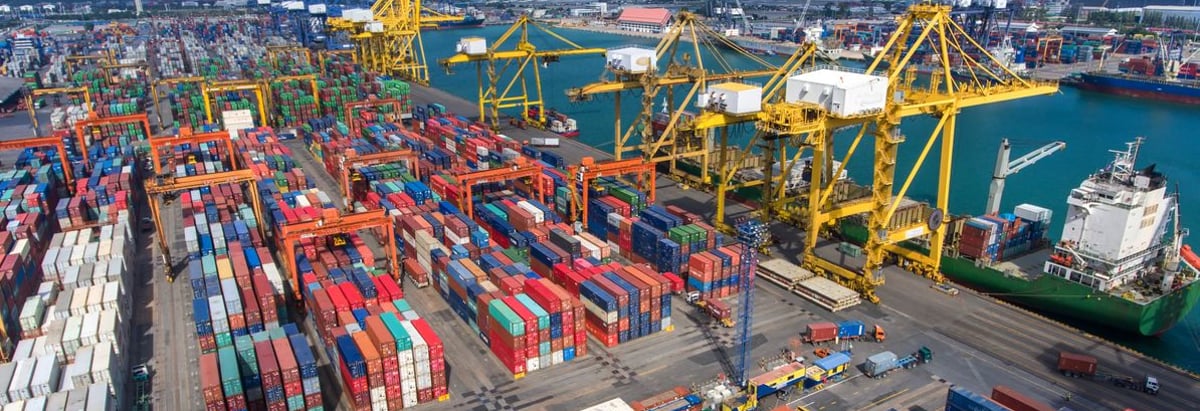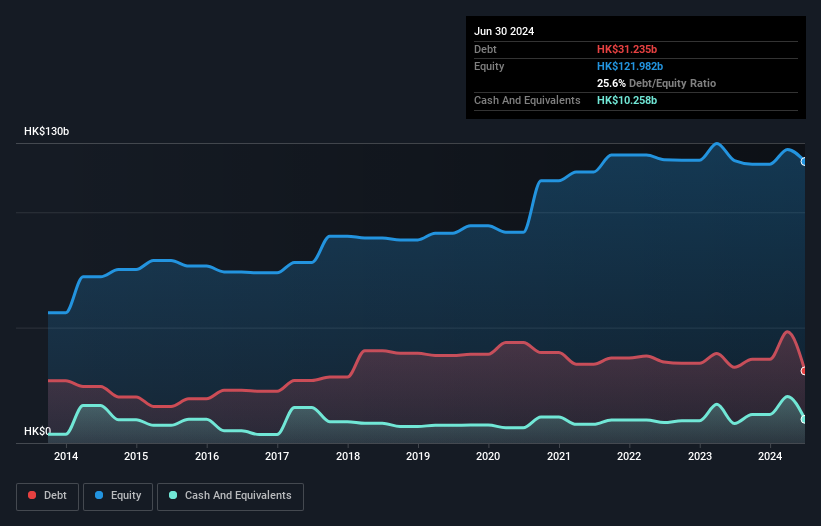- Hong Kong
- /
- Infrastructure
- /
- SEHK:144
These 4 Measures Indicate That China Merchants Port Holdings (HKG:144) Is Using Debt Reasonably Well

Some say volatility, rather than debt, is the best way to think about risk as an investor, but Warren Buffett famously said that 'Volatility is far from synonymous with risk.' So it seems the smart money knows that debt - which is usually involved in bankruptcies - is a very important factor, when you assess how risky a company is. As with many other companies China Merchants Port Holdings Company Limited (HKG:144) makes use of debt. But should shareholders be worried about its use of debt?
When Is Debt A Problem?
Generally speaking, debt only becomes a real problem when a company can't easily pay it off, either by raising capital or with its own cash flow. Part and parcel of capitalism is the process of 'creative destruction' where failed businesses are mercilessly liquidated by their bankers. However, a more common (but still painful) scenario is that it has to raise new equity capital at a low price, thus permanently diluting shareholders. Having said that, the most common situation is where a company manages its debt reasonably well - and to its own advantage. The first thing to do when considering how much debt a business uses is to look at its cash and debt together.
Check out our latest analysis for China Merchants Port Holdings
What Is China Merchants Port Holdings's Net Debt?
You can click the graphic below for the historical numbers, but it shows that China Merchants Port Holdings had HK$31.2b of debt in June 2024, down from HK$32.8b, one year before. However, it does have HK$10.3b in cash offsetting this, leading to net debt of about HK$21.0b.

A Look At China Merchants Port Holdings' Liabilities
Zooming in on the latest balance sheet data, we can see that China Merchants Port Holdings had liabilities of HK$18.0b due within 12 months and liabilities of HK$31.0b due beyond that. On the other hand, it had cash of HK$10.3b and HK$2.76b worth of receivables due within a year. So it has liabilities totalling HK$36.0b more than its cash and near-term receivables, combined.
This deficit is considerable relative to its market capitalization of HK$49.1b, so it does suggest shareholders should keep an eye on China Merchants Port Holdings' use of debt. This suggests shareholders would be heavily diluted if the company needed to shore up its balance sheet in a hurry.
We use two main ratios to inform us about debt levels relative to earnings. The first is net debt divided by earnings before interest, tax, depreciation, and amortization (EBITDA), while the second is how many times its earnings before interest and tax (EBIT) covers its interest expense (or its interest cover, for short). This way, we consider both the absolute quantum of the debt, as well as the interest rates paid on it.
China Merchants Port Holdings has a debt to EBITDA ratio of 3.8 and its EBIT covered its interest expense 3.1 times. Taken together this implies that, while we wouldn't want to see debt levels rise, we think it can handle its current leverage. The good news is that China Merchants Port Holdings improved its EBIT by 6.9% over the last twelve months, thus gradually reducing its debt levels relative to its earnings. When analysing debt levels, the balance sheet is the obvious place to start. But it is future earnings, more than anything, that will determine China Merchants Port Holdings's ability to maintain a healthy balance sheet going forward. So if you want to see what the professionals think, you might find this free report on analyst profit forecasts to be interesting.
Finally, a company can only pay off debt with cold hard cash, not accounting profits. So we always check how much of that EBIT is translated into free cash flow. Happily for any shareholders, China Merchants Port Holdings actually produced more free cash flow than EBIT over the last three years. There's nothing better than incoming cash when it comes to staying in your lenders' good graces.
Our View
When it comes to the balance sheet, the standout positive for China Merchants Port Holdings was the fact that it seems able to convert EBIT to free cash flow confidently. However, our other observations weren't so heartening. For example, its interest cover makes us a little nervous about its debt. We would also note that Infrastructure industry companies like China Merchants Port Holdings commonly do use debt without problems. When we consider all the factors mentioned above, we do feel a bit cautious about China Merchants Port Holdings's use of debt. While debt does have its upside in higher potential returns, we think shareholders should definitely consider how debt levels might make the stock more risky. When analysing debt levels, the balance sheet is the obvious place to start. But ultimately, every company can contain risks that exist outside of the balance sheet. We've identified 1 warning sign with China Merchants Port Holdings , and understanding them should be part of your investment process.
If you're interested in investing in businesses that can grow profits without the burden of debt, then check out this free list of growing businesses that have net cash on the balance sheet.
If you're looking to trade China Merchants Port Holdings, open an account with the lowest-cost platform trusted by professionals, Interactive Brokers.
With clients in over 200 countries and territories, and access to 160 markets, IBKR lets you trade stocks, options, futures, forex, bonds and funds from a single integrated account.
Enjoy no hidden fees, no account minimums, and FX conversion rates as low as 0.03%, far better than what most brokers offer.
Sponsored ContentNew: AI Stock Screener & Alerts
Our new AI Stock Screener scans the market every day to uncover opportunities.
• Dividend Powerhouses (3%+ Yield)
• Undervalued Small Caps with Insider Buying
• High growth Tech and AI Companies
Or build your own from over 50 metrics.
Have feedback on this article? Concerned about the content? Get in touch with us directly. Alternatively, email editorial-team (at) simplywallst.com.
This article by Simply Wall St is general in nature. We provide commentary based on historical data and analyst forecasts only using an unbiased methodology and our articles are not intended to be financial advice. It does not constitute a recommendation to buy or sell any stock, and does not take account of your objectives, or your financial situation. We aim to bring you long-term focused analysis driven by fundamental data. Note that our analysis may not factor in the latest price-sensitive company announcements or qualitative material. Simply Wall St has no position in any stocks mentioned.
About SEHK:144
China Merchants Port Holdings
An investment holding company, engages in ports operation, bonded logistics operation, and property investment Mainland China, Hong Kong, Taiwan, Brazil, and internationally.
Undervalued with solid track record and pays a dividend.
Similar Companies
Market Insights
Community Narratives



